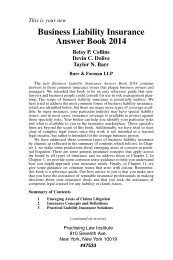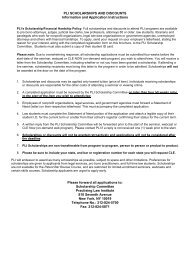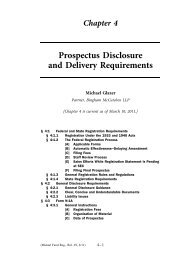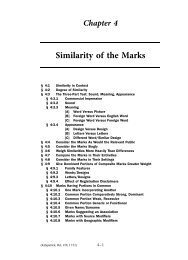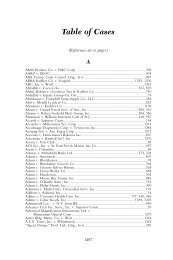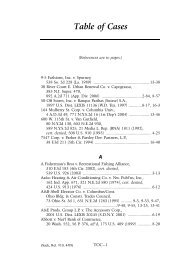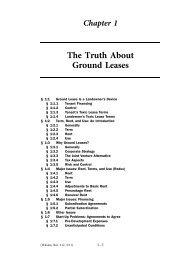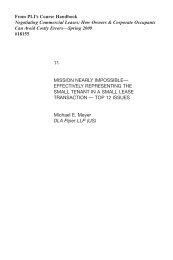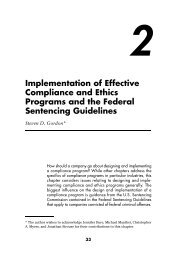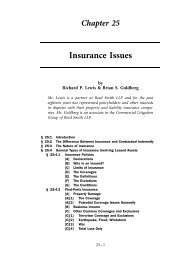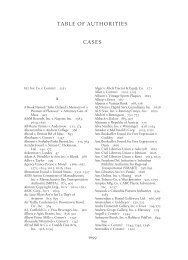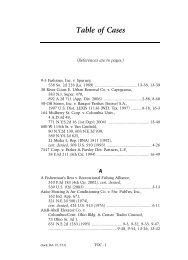Breach of Fiduciary Duty
Breach of Fiduciary Duty
Breach of Fiduciary Duty
Create successful ePaper yourself
Turn your PDF publications into a flip-book with our unique Google optimized e-Paper software.
<strong>Breach</strong> <strong>of</strong> <strong>Fiduciary</strong> <strong>Duty</strong> § 7:1.5<br />
<strong>of</strong> the fiduciary relationship, 71 for example, by using a “straw person”<br />
to deal on behalf <strong>of</strong> the fiduciary; 72 (3) secretly acting for an adverse<br />
party in a matter within the scope <strong>of</strong> the fiduciary relationship; 73<br />
(4) competing as to a matter within the scope <strong>of</strong> the fiduciary relationship;<br />
74 or (5) acting on behalf <strong>of</strong> a party whose interests conflict with<br />
those <strong>of</strong> the person to whom the fiduciary duties are owed. 75 In sum,<br />
many potential breaches <strong>of</strong> loyalty by accountants involve conflicts <strong>of</strong><br />
interest; for example, self-dealing by an accountant or receipt by an<br />
accountant <strong>of</strong> a commission or a fee from a third party in return for<br />
recommending an investment or service to the client.<br />
An accountant who is a fiduciary may generally act on his own<br />
account or for the account <strong>of</strong> another as to a matter within the scope <strong>of</strong><br />
the fiduciary relationship with the consent <strong>of</strong> the party to whom the<br />
duty <strong>of</strong> loyalty is owed. 76 However, the accountant-fiduciary still has a<br />
duty to deal fairly with the party. 77 For example, where the accountantfiduciary<br />
enters into a transaction with a party to whom a fiduciary<br />
duty is owed, he or she must disclose all relevant facts to the party and,<br />
even then, may enter into a deal only on fair terms. 78 In addition, the<br />
burden is on the accountant-fiduciary to prove both the fairness <strong>of</strong> the<br />
transaction and the disclosure <strong>of</strong> all material facts. 79<br />
An accountant who is an ERISA fiduciary may not:<br />
(1) deal with the assets <strong>of</strong> the plan in his own interest or for his<br />
own account,<br />
(2) in his individual or in any other capacity act in any<br />
transaction involving the plan on behalf <strong>of</strong> a party (or<br />
represent a party) whose interests are adverse to the interests<br />
<strong>of</strong> the plan or the interests <strong>of</strong> its participants or<br />
beneficiaries, or<br />
71. See id. § 389 (Acting as Adverse Party without Principal’s Consent);<br />
RESTATEMENT OF RESTITUTION §§ 192 (Purchase by <strong>Fiduciary</strong> Individually<br />
<strong>of</strong> Property Entrusted to Him as <strong>Fiduciary</strong>) and 193 (Sale <strong>of</strong> <strong>Fiduciary</strong>’s<br />
Individual Property to Himself as <strong>Fiduciary</strong>) (1937).<br />
72. RESTATEMENT (SECOND) OF AGENCY § 389 cmt. a (1958).<br />
73. See, e.g., id. § 390.<br />
74. RESTATEMENT (SECOND) OF AGENCY § 393 (1958); RESTATEMENT OF<br />
RESTITUTION § 199 (1937).<br />
75. See, e.g., RESTATEMENT (SECOND) OF AGENCY § 394 (Acting for One with<br />
Conflicting Interests) (1958).<br />
76. See id. §§ 390 (Acting as Adverse Party with Principal’s Consent) and 392<br />
(Acting for Adverse Party with Principal’s Consent).<br />
77. See id. § 390 cmt. c and § 392 cmt. a.<br />
78. See RESTATEMENT (SECOND) OF CONTRACTS § 173 (When Abuse <strong>of</strong> a<br />
<strong>Fiduciary</strong> Relation Makes a Contract Voidable) (1981); BOGERT, TRUSTS<br />
§ 96 (Trustee’s <strong>Duty</strong> in Transactions with Beneficiary) (6th ed. West 1987).<br />
79. Squyres v. Christian, 242 S.W.2d 786, 790–91 (Tex. Civ. App. 1951).<br />
(Goldwasser & Arnold, Rel. #14, 10/11)<br />
7–15



